Islamophobia is the fear of, hatred of, or prejudice against the religion of Islam or Muslims in general, especially when seen as a geopolitical force or a source of terrorism.

The September 11 attacks transformed the first term of President George W. Bush and led to what he referred to as the war on terror. The accuracy of describing it as a "war" and its political motivations and consequences are the topic of strenuous debate. The U.S. government increased military operations, economic measures, and political pressure on groups that it accused of being terrorists, as well as increasing pressure on the governments and countries which were accused of sheltering them. October 2001 saw the first military action initiated by the US. Under this policy, NATO invaded Afghanistan to remove the Taliban regime and capture al-Qaeda forces.
Religious persecution is the systematic mistreatment of an individual or a group of individuals as a response to their religious beliefs or affiliations or their lack thereof. The tendency of societies or groups within societies to alienate or repress different subcultures is a recurrent theme in human history. Moreover, because a person's religion frequently determines his or her sense of morality, worldview, self-image, attitudes towards others, and overall personal identity to a significant extent, religious differences can be significant cultural, personal, and social factors.

Balbir Singh Sodhi, a Sikh-American entrepreneur and franchisee in Mesa, Arizona, was murdered in a hate crime in the aftermath of the September 11 attacks. This was the first of several cases across the United States that were reported to the police as supposed acts of retaliation for the attacks. Balbir Singh Sodhi, who had a beard and wore a turban in accordance with his Sikh faith, was mistakenly profiled as an Arab Muslim and murdered by 42-year-old Frank Silva Roque, a Boeing aircraft mechanic at a local repair facility who held a criminal record for an attempted robbery in California. Roque had reportedly told friends that he was "going to go out and shoot some towel-heads" the day of the attacks. Roque was sentenced to death for first degree murder. He died in prison on May 11, 2022.
Human rights in India is an issue complicated by the country's large size and population as well as its diverse culture, despite its status as the world's largest sovereign, secular, socialist democratic republic. The Constitution of India provides for fundamental rights, which include freedom of religion. Clauses also provide for freedom of speech, as well as separation of executive and judiciary and freedom of movement within the country and abroad. The country also has an independent judiciary as well as bodies to look into issues of human rights.

Hinduism is the third largest religious group in the United Kingdom, after Christianity and Islam; the religion is followed by around 1.7% of the total population of the nation. Hindus had a presence in the United Kingdom since the early 19th century, as at the time India was part of the British Empire. Many Indians in the British Indian Army settled in the United Kingdom of Great Britain and Northern Ireland. According to 2021 United Kingdom census, 1,032,775 residents (1.7%) identified themselves as Hindus.

Sikhism in Pakistan has an extensive heritage and history, although Sikhs form a small community in Pakistan today. Most Sikhs live in the province of Punjab, a part of the larger Punjab region where the religion originated in the Middle Ages, with some also residing in Peshawar in the Khyber-Pakhtunkhwa province. Nankana Sahib, the birthplace of Guru Nanak, the founder of Sikhism, is located in Pakistan's Punjab province. Moreover, the place where Guru Nanak Dev died, the Gurudwara Kartarpur Sahib is also located in the same province.

A dastār is an item of headwear associated with Sikhism, and is an important part of Sikh culture. The word is loaned from Persian through Punjabi. In Persian, the word dastār can refer to any kind of turban and replaced the original word for turban, dolband (دلبند), from which the English word is derived.
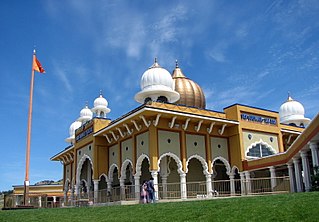
American Sikhs form the country's sixth-largest religious group. While the U.S. Census does not ask about religion, 70,697 Americans declared Sikh as their ethnicity in the 2020 census. The U.S. Census Bureau estimated the adult Sikh American population at 78,000 in 2008. The Pew Research Center estimated the Sikh American adult population to be 140,000 and the total population at 200,000 in 2012 while the World Religion Database at Boston University estimated the American Sikh population to be at 280,000 in 2012. Sikh organizations like the Sikh Coalition and American Sikh Congressional Caucus estimate the Sikh American population to be as high as 1,000,000, but do not provide any sources for these figures; 500,000 nevertheless remains the most cited Sikh American population size. With 1% of Asian Americans being Sikh, and 90.7% of Sikh Americans being Asian American, the American Sikh population can be estimated at around 200,000-300,000 in 2021. The largest Sikh populations in the U.S. are found in California (52%), New York (11%), and Washington (6%).
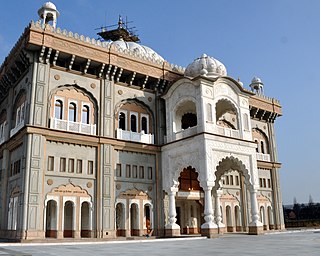
British Sikhs number over 520,000 people and account for 0.85% of the British population as of 2021, forming the United Kingdom's fourth-largest religious group. According to the 2021 United Kingdom census, British Sikhs numbered 524,529, with 520,092 in England, 4,048 in Wales, and 389 in Northern Ireland. The largest Sikh populations in the United Kingdom are in the West Midlands and Greater London.
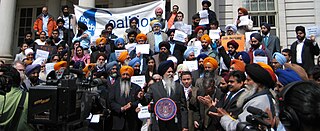
The Sikh Coalition is a Sikh-American non-profit advocacy group that defends Sikh civil rights founded in 2001 with offices in New York City, Washington, D.C., and Fremont, California.
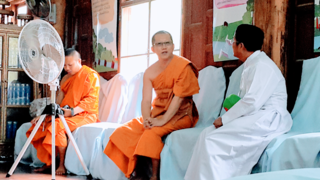
According to the 2018 census, Buddhism is the largest religion in Thailand, practiced by over 94% of the population; Islam makes up 5% of the population. The Thai government officially recognizes five religions: Buddhism, Islam, Hinduism, Sikhism, and Christianity.
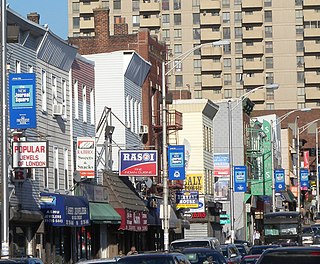
Indian Americans are citizens of the United States with ancestry from India. The terms Asian Indian and East Indian are used to avoid confusion with Native Americans in the United States, who are also referred to as "Indians" or "American Indians." With a population of more than 4.4 million, Indian Americans make up approximately 1.35% of the U.S. population and are the largest group of South Asian Americans, the largest Asian-alone group, and the largest group of Asian Americans after Chinese Americans. Indian Americans are the highest-earning ethnic group in the United States.
Religious discrimination in Pakistan is a serious issue for the human rights situation in modern-day Pakistan. Hindus, Christians, Sikhs, Shias, and Ahmadis among other religious minorities often face discrimination and at times are even subjected to violence. In some cases Christian churches and the worshippers themselves have been attacked. Khawaja Nazimuddin, the 2nd Prime Minister of Pakistan, stated: "I do not agree that religion is a private affair of the individual nor do I agree that in an Islamic state every citizen has identical rights, no matter what his caste, creed or faith be".
Anti–Middle Eastern sentiment is hostility to, prejudice towards, or discrimination against people who belong to or originate from the various ethnic groups of the Middle East. Although it is commonly associated with Islamophobia, as Muslims constitute the majority of the region's population, it is a distinct type of hatred in itself and may not always stem from religion-based animosity. People who harbour negative feelings towards the region's people view them as barbaric and inferior on racial, ethnic, cultural, or religious grounds, or a combination of any of these factors.

Tell MAMA is a national project which records and measures anti-Muslim incidents in the United Kingdom. It is modelled on the Jewish Community Security Trust (CST) and like the CST it also provides support for victims, working closely with organisations such as Victim Support. The reception of the group by British Muslims is highly mixed, due to the relationship between Tell MAMA and the Jewish CST group.

American Muslims often face Islamophobia and racialization due to stereotypes and generalizations ascribed to them. Due to this, Islamophobia is both a product of and a contributor to the United States' racial ideology, which is founded on socially constructed categories of profiled features, or how people seem.
Islamophobia in Canada refers to a set of discourses, behaviours and structures which express feelings of anxiety, fear, hostility and rejection towards Islam or Muslims in Canada.
Islamophobia in the United Kingdom refers to a set of discourses, behaviours and structures which express feelings of anxiety, fear, hostility and rejection towards Islam or Muslims in the United Kingdom. Islamophobia can manifest itself in a wide range of ways; including, discrimination in the workforce, negative coverage in the media, and violence against Muslims.

Baitus Samee Mosque is a prominent Ahmadi Muslim mosque in Houston, in the U.S. state of Texas. It was developed in stages during 1998 to 2004; its doors opened in 2001 or 2002.